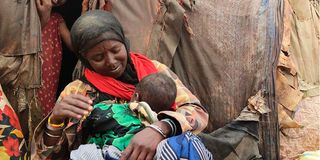Drought leaves a trail of malnourished breastfeeding women

Gumato Qunyo Adhi breastfeeding her seven-month-old daughter outside her hut at Shankera hills in North Horr, Marsabit county on September 22, 2022.
What you need to know:
- The last meal Gumato Qunyo Adhi from Marsabit County had was cooked dried maize.
- The maize was a donation from a consortium of international humanitarian organisations.
- Lack of food has taken a toll on her mental health.
- There is danger to having malnourished breastfeeding women.
Gumato Qunyo Adhi holds her seven-month-old daughter in her arms. She is suckling.
She dazes a broad lovely smile at her. All the while, her tiny hand plays with mama’s fingers as she sits outside her hut at Shankera village in North Horr, Marsabit County; to feed her.
But mama is not doing well.
“I’m feeling dizzy and my legs are weak. It’s because I’m so hungry. But I have to breastfeed her to keep her alive,” says Ms Adhi who has five other children.
I interview her a few minutes past noon upon return from Shankera hills where she had gone to fetch firewood. She had left behind the child with her older daughter, aged eight years.
“We had cooked dried maize. That’s what we ate last night. In the morning we drank water,” she says.
“We remained with a portion of the cooked dried maize and that’s what we will take for supper. I don’t know what we will eat tomorrow. I have no maize left.”
The maize she got was a donation from a consortium of international humanitarian organisations supplying food relief and water to the vulnerable households - those with children aged below five years and breastfeeding women - in the county.
Her neighbour Badhole Adhano Doko, also has a one year and five-month-old son to breastfeed.

Badhole Adhano Doko outside her hut at Shankera hills in North Horr, Marsabit County on September 22, 2022 during the interview on the impact of drought on her as a breastfeeding mother. She has one year and five-month-old son.
And lack of food has already taken a toll on her mental health.
“All through the night and day I’m wondering, will my children survive? Will we receive food before it's too late? When are the rains coming so that we can have enough pasture for our goats?” wonders Ms Doko who has four children.
She says she allows her son to breastfeed for as long as he wishes to “just keep him alive” even when it’s “too painful because the breasts are empty.”
Just like Ms Adhi, she and her children took boiled dried maize yester night. She also received the donation from the same organisations.
She says her husband had remained with few goats but they were too emaciated to attract a good price. He had travelled with them to a distant grazing field. But she fears he may return without them as often most died enroute.
“Had there been rains and enough pasture, the goats would be well fed and fat. I’d be milking them. The milk would be enough for all of us,” she says.
Humanitarian assistance
“We would also sell a goat for Sh9,000 or Sh8,000 and use the money to buy an adequate supply of food. Now, no one wants to buy the goats because they are too thin.”
“I can’t take this anymore. This is too much for me to bear,” she says.
Ms Adhi and Ms Doko are among the estimated 229,893 people presently in need of humanitarian assistance in the county, based on the data from National Drought Management Authority (NDMA).
But without food, water, and pasture for the people and animals, NDMA Marsabit County Drought Coordinator Parkolwa Mustafa, warns that the number is likely to grow beyond 252,000 by October.
Unfortunately, there are no actual figures of breastfeeding women affected by the drought. But there are 216,219 women in the county based on the 2019 Census and here by age 14, girls are married off.
And at age 40, women are still having children. The county ranks second with highest fertility rates at seven births per woman after Mandera (eight births per woman).
There is danger to having malnourished breastfeeding women.
A 2019 study Maternal Malnutrition, Breastfeeding, and Child Inflammation in India found breast milk from malnourished mothers may stimulate inflammation in breastfed children.
Lactating mothers
Centres for Disease Control and Prevention (CDC) says a mother’s need for iodine and choline increases during lactation; nutrients essential to maintaining thyroid health, immune function, and brain and nervous system support.
Ms Adhi’s mention of experiencing weakness in her legs is a plain sign of a deficiency of both nutrients.
The Dietary Guidelines for Americans recommend lactating mothers to consume 290 mcg of iodine and 550mg of choline daily throughout the first year postpartum.
Iodine, according to the CDC, can be found in dairy products, eggs, seafood, or in iodised table salt, yet all these are unavailable to the women here.
Choline is also found in dairy and protein food groups, such as eggs, meats, some seafood, beans, peas, and lentils, indicates CDC.
When a colleague asked Ms Doko the last time she ate an egg, it felt like an insult.
Our translator asked: “What kind of a question is that? Where will they get eggs from? Which chicken will survive here? Have you seen any chicken around here?”





